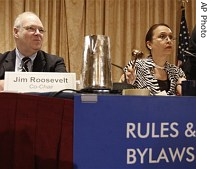2007年VOA标准英语-US Political Parties Caution States on Holding
搜索关注在线英语听力室公众号:tingroom,领取免费英语资料大礼包。
(单词翻译)
By Jim MaloneWashington
30 August 2007
The competition among U.S. states to hold their presidential primary contests early in 2008 is causing some major problems for the two major national parties that are trying to control the nominating process. VOA National correspondent Jim Malone reports from Washington.
 |
| Co-chairs of the Democratic National Committee's Rules and Bylaws Committee hold hearing in Washington, 25 Aug 2007 |
The national Democratic and Republican parties are trying to control the process to ensure that Iowa and New Hampshire continue in their traditional role of being the first in the presidential nominating process early in 2008.
In the case of Florida, the national Democratic Party is threatening to not seat Florida's delegates to the Democratic National Convention next August, depriving Florida Democrats of a role in the selection of the party's presidential nominee2.
National party officials want Florida to reverse its decision to shift its primary next year from February 5 to January 29.
"I am going to send a message to everybody in Florida that we are going to follow the rules," said Donna Brazile, who chairs the Voting Rights Institute for the Democratic National Committee.
The two sides have 30 days to try and work out a compromise before the penalty would take effect.
Republican National Committee officials are also warning states that any attempt to move up their primaries into early January could result in sanctions. Wyoming Republicans now want to begin their delegate selection process on January 5.
Political experts say both parties need to be careful not to alienate3 voters in the states involved, especially in large states like Florida that will be closely contested in the general election.
Experts also say the competition among the states is fierce, because many states want to have an early voice in the process that selects the party nominees4 through a series of primaries and voter caucuses6.
"This is an insane schedule. It makes absolutely no sense," said Larry Sabato, who directs the Center for Politics at the University of Virginia. "It is not in the national interest. We have 50 entities7, 50 states that are leapfrogging one another, trying to gain advantage. They are trying to get as early as possible so that they can help to determine the nominees of both parties."
John Fortier, a political scientist at the American Enterprise Institute in Washington, says the rush for an earlier primary schedule in 2008 is part of a long-term trend in U.S. politics.
"The primaries have been moving earlier and earlier over the past 30 years," he explained. "Essentially8, each state and each state's party can decide when to have their primaries, and it is very hard for the national parties to discipline them. It is a war between the states, essentially, where there is no way to discipline them and they keep pushing the primaries earlier and earlier."
Some of the presidential contenders, particularly those who are lagging behind in the polls and in fundraising, worry that the surge of large states to the beginning of the primary process will hurt their chances to win their party's nomination9.
Senator Joe Biden of Delaware, who is seeking the Democratic Party's presidential nomination, spoke10 to CBS television.
"It means that this nomination goes to the highest bidder11, whoever has the most money to engage in wholesale12 politics of going up on television in the big states, and it would be a shame if that happens," he said.
Despite the competition among the states to move up their primary and caucus5 dates, experts question whether the quicker start will compel Americans to pay attention to the presidential campaign any earlier.
Stuart Rothenberg publishes an independent political newsletter in Washington and was a guest on VOA's Encounter program.
"We have started very early," he noted13. "I personally do not think that people are making hard and fast decisions yet about whom they are going to support. I think they continue to look at all the candidates, evaluate them, have opinions one way or the other, but that is very different from deciding very firmly who to support."
Iowa and New Hampshire were scheduled to initiate14 the nomination process in mid-January, but jockeying by other states has created uncertainty15 about when exactly the presidential selection process will begin.




